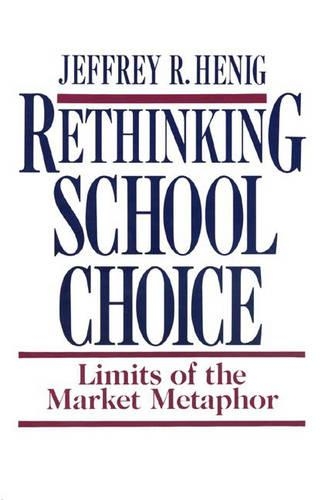
Rethinking School Choice: Limits of the Market Metaphor
(Paperback, Revised edition)
Publishing Details
Rethinking School Choice: Limits of the Market Metaphor
By (Author) Jeffrey R. Henig
Princeton University Press
Princeton University Press
24th October 1995
Revised edition
United States
Classifications
Professional and Scholarly
Non Fiction
Schools and pre-schools
Political science and theory
Educational administration and organization
371.01
Physical Properties
Paperback
312
Width 197mm, Height 254mm
454g
Description
Advocates of school vouchers and other choice proposals couch their arguments in the fashionable language of economic theory. Choice initiatives at all levels of government have succeeded, it is claimed, because they shift responsibility for education reform from government to market forces. This timely book disputes the appropriateness of the market metaphor as a guide to education policy. Engaging the debate on the levels both of empirical analysis and democratic theory, Jeffrey R. Henig traces the evolution of school choice as an idea and in practice. Its legacy, he observes, is a mixed one. Sometimes it has been a vehicle for racial and economic segregation, with divisive and corrosive effects. Where school choice has worked, the record shows, it has depended less on the magic of the market than on an elusive combination of strong political leadership, resolute governmental commitment, supportive coalitions of private interests, and a willingness on all sides to challenge parochial gain in the name of the larger social good. The real danger in market-based choice proposals, Henig argues, is not that they might allow some children to attend private schools at public expenses, but that they tend to crowd out the public forums that must flourish if questions of national policy are to be democratically resolved. Rather than concentrating on the comparative merits of private and public institutions as service-delivery mechanisms, the urgent need in the years ahead will be to focus on their relative advantages in promoting deliberation, debate, and decision-making.
Reviews
"For anyone interested in a full treatment of [choice], Henig's Rethinking School Choice is an absolute must. Exhaustive, comprehensive, and balanced, Henig's book sets the standard, for style as well as context, against which others will be measured."--Gerald Bracey, The Washington Post "A tightly argued effort to reduce the crisis mentality about American education and suggest that shopping for schools is not the same as shopping for VCRs... An intricate but fair-minded discussion that ultimately--while for choice--comes down against market-based vouchers."--Kirkus Reviews "This book makes a forceful, tough-minded contribution to the raging debate over school choice. But it goes well beyond this debate, and refocuses the way we look at education."--John F. Witte, University of Wisconsin-Madison, co-editor of Choice and Control in American Education
Author Bio
Jeffrey R. Henig is Professor of Political Science and Director of the Center for Washington Area Studies at George Washington University. His other books include Public Policy and Federalism: Issues in State and Local Politics.
